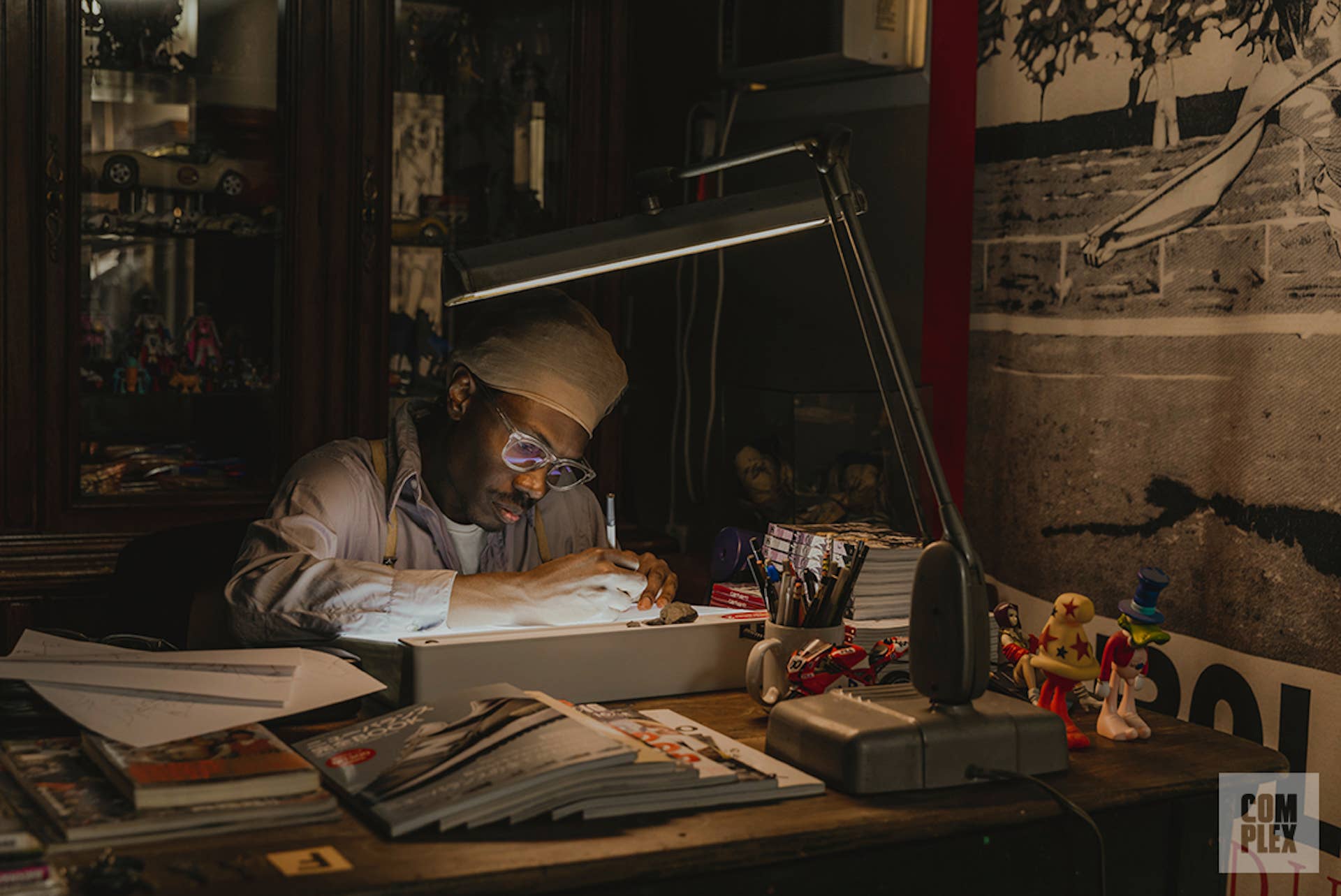
After working for months on creative projects for clients like Virgil Abloh and Chris Gibbs, Reginald Jolley, better known as Reggieknow, is barely getting any sleep these days. When I dialed into Reggieknow’s world via Zoom, he spoke to me from a dimly lit office in his Los Angeles duplex. He’s so sleep-deprived from a project he worked on with Abloh that his head is slumping into a cardigan draped over his office chair, which happens to be the same sweater Paul Michael Glaser wore in Starsky & Hutch. But after falling asleep on Zoom, he springs himself awake and is able to answer my question in full. Although it’s hard to make out what his workspace looks like, Reggieknow says he likes decorating his rooms with objects that inspire him—things like Vaughn Bode characters, original ’90s Polo Stadium pieces, and anime toys. The room he’s currently speaking from is modeled after the office of Noble Drew Ali, who founded America’s first Black Muslim organization, the Moorish Science Temple of America. Similar to Ali’s space, an American flag flipped sideways with 48 stars hangs above Reggieknow’s head during our Zoom chats, and it’s all I see whenever his head starts to plop down to his chest.
“My sleeping pattern is so horrible right now; it’s crossing the line into being unhealthy,” says Reggieknow. “I’m getting it where I can, but I sleep better at my desk than I do in my bed. I have to trick myself into bed because my brain is always spinning, and it won't quiet down.”
It’s been a busy year for Reggieknow, short for “Reggie knows best.” Before the pandemic, he flew out to Wyoming on a private jet with Kanye West to chop it up about the creative direction of the Yeezy apparel line. He’s been working with Gibbs on Union’s Air Jordan IV campaign, which was centered on a hip-hop anime Reggieknow’s been building for over a decade. And he’s had long Zoom calls with Abloh to talk about Black creativity and hip-hop.
“Well, what's funny is I'm pretty boring,” says Reggieknow with a smile. “My day-to-day is just a lot of creative problem solving, and I've always said the life of creative ideas really depends on who is on the other side of the desk. By chance it’s the decision maker who has a vision, then everything is great.”
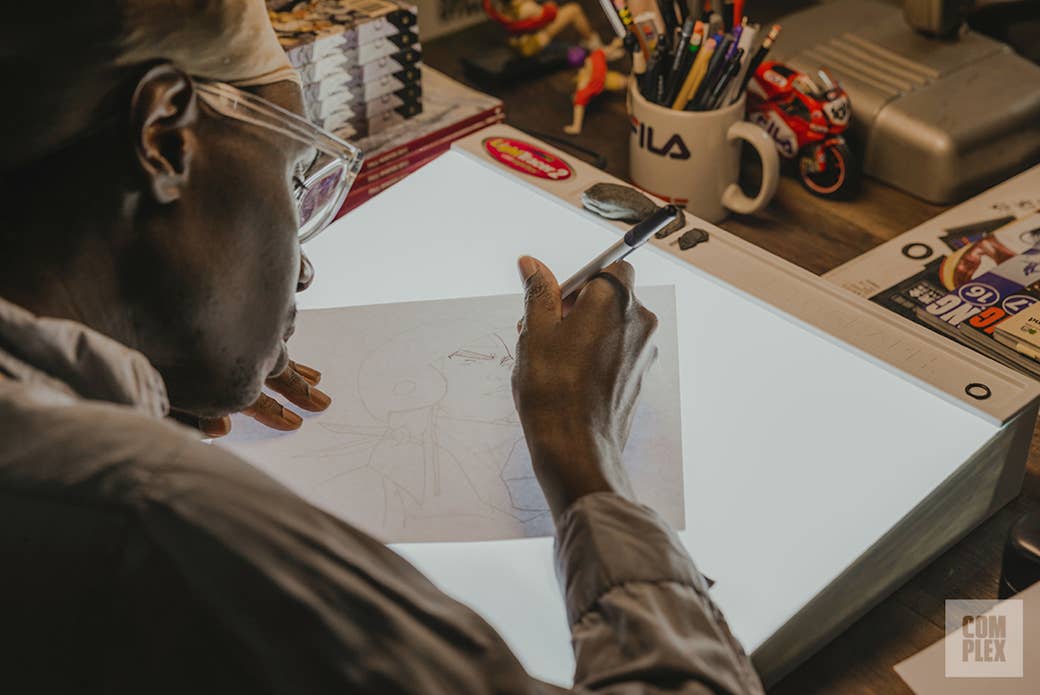
Reggieknow, who West once dubbed the “God of Chicago hip-hop,” is an influencer who never needed to show his face on Instagram. The Chicago native, who now resides in Los Angeles’ Chinatown neighborhood, humbly describes himself as a “secret weapon” for creatives like Abloh and West and big corporate brands wanting to be “cool.” He’s a behind-the-scenes problem solver who has shaped the way your favorite artists and designers think.
His influence dates back to the early ’90s, when he was building a fundamental hip-hop scene in Chicago through the Dem Dare parties, which musically influenced acts like Common and West and popularized Polo in the city. Simultaneously, he worked as a pioneering ad man who informed corporate America on how it could authentically showcase hip-hop in advertising. One of his earliest projects was launching the “Obey Your Thirst” campaign for Sprite, which featured rappers like Nas and Mos Def—Reggieknow also helped conceive 50 Cent’s ‘Formula 50’ Vitamin Water ads in the 2000s. And most recently he illustrated the characters that defined Louis Vuitton’s Spring/Summer 2021 runway show, which marked the first time the French luxury house ever collaborated with a Black artist on the runway. Reggieknow is a reclusive artist who says he’s been in quarantine for the past decade, but if you are a living and breathing consumer, you’ve felt his impact.
On a Zoom call, Abloh says he remembers Reggieknow being such a prolific figure in his city that locals would admire him from a distance instead of actually speaking to him. Although the two had crossed paths before, Abloh decided to formally reach out to Reggieknow this year to build a rapport and show appreciation for his work. After a couple of conversations, he realized Reggieknow’s illustrations could help build the foundation for his Spring/Summer 2021 Louis Vuitton Collection—since becoming Louis Vuitton’s artistic director of menswear, Abloh has worked with Futura, Nigo, and other streetwear OGs who have set a blueprint for Abloh and others. Reggieknow is probably the least-known name of that bunch, but Abloh says he’s equally important and his impact extends beyond fashion.
“Diversity in fashion, it's a hot topic right now. Everyone says that, and what that means is the output is different. If I'm at Louis Vuitton, part of my job is to represent the culture that I came from,” says Abloh.
Reggieknow says he was inspired by animators like Ralph Bakshi, graffiti writers like Kase 2, and breakdancers like Doze Green when drawing the “motley crew” of characters for The Adventures of Zoooom With Friends, a four-minute short film by Louis Vuitton that debuted during digital Paris Fashion Week in July. Directed by Abloh, the film featured characters Reggieknow illustrated that became foundational for Abloh’s collection, which focused on the designer’s Ghanian heritage and Afrocentric themes that Abloh described as “manifesting Black imagination in real life.” Characters that Reggieknow and Abloh conceived, such as “Joe Schmo”—an anthropomorphic dog sporting a checkerboard Louis Vuitton Damier suit and Bootsy Collins-esque LV sunglasses—appeared as stuffed puppets on garments, patches on monogrammed leather accessories, and giant parade balloons that rested on top of shipping containers at LV’s physical runway shows in Shanghai and Tokyo. Abloh says these characters represent him and his friends—he named them after the young Black creatives working in his studio, including photographer Cam Hicks and the British filmmaker Bafic.
“We kind of look like these characters, and who would have thought that we would travel the world and be where we are?” says Abloh from his home in Chicago. “That's what happens when you diversify fashion. All of a sudden, things look different and they have different stories. And I'm more proud of the Black creativity that exists in these subcultures, which make brands relevant, and we're now in a position to create.”
The roots of Reggieknow’s imagination can be traced back to the West Side of Chicago, where his parents were also raised. His mother was a caseworker and his late father, a Marine veteran who struggled with substance abuse, briefly worked for Chicago’s Transit Authority. Although Reggieknow remembers being a less-than-stellar student, creativity ran in his blood. “My dad was also an artist, but he didn’t do anything with those talents,” says Reggieknow. "My grandfather on his side was an illustrator, but didn't have a chance to pursue the arts either. To date, I'm the first to actually do something with this talent." Reggieknow started drawing by sketching out comic book superheroes and then transitioned into creating graffiti characters as a young adult. Disk Darian, a graffiti writer from Humboldt Park, lived a couple of blocks away from Reggieknow and remembers being impressed by his drawings as a teen.
“Reggie's two years older than me, but I knew of Reggie while I was in high school because his characters would show up in notable writer’s blackbooks [sketch books,]” says Darian. “I was blown away by his details and characters, even back then.”
But as a graffiti artist, Reggieknow, whose tag was “RegNoc,” was uninterested in running around subway tunnels to spray paint his name on train cars. Early on, he realized he could turn his talents for drawing into a career. Instead of graffiti bombing, he began attending classes at the American Art Academy of Chicago and graduated with a degree in illustration and advertising in 1990. Within a year of graduating, he became a storyboard artist at a graphic design studio in Chicago that contracted work for Burrell Communications—a pioneering Chicago-based ad agency that was the No. 1 Black-owned ad agency in the country. His work caught the attention of Alma Hopkins, a creative director at Burrell, who quickly hired him to be a junior art director.
“It wasn’t like that position was open and I was just looking for people. We needed help, and he hit the ground running,” says Hopkins. “I was always on the lookout for talent that stood out, because I still feel that’s the hardest thing to find. When most people are looking for talent, they look for work that looks like everything else they’ve seen because they want to fit in. Reggie always gave you that unexpected twist.”
By 1990, Burrell had been around for nearly two decades and was guided by a simple slogan from its founder Tom Burrell: “Black people are not dark-skinned white people.” The ad agency knew that the best way to reach Black consumers was simple. Ads should highlight Black culture positively and respectfully, which white advertising firms have consistently failed to do. Throughout the ’90s, Reggieknow’s work for Burrell built upon that ethos by bringing underground hip-hop into the television sets of mainstream America. Within the professional world of advertising, he’s recognized for being the mind behind Burrell’s first “Obey Your Thirst” ads for Sprite. Although it seems commonplace for rappers to collaborate with major corporations today, the climate was different back then. Early on, Burrell understood the growing popularity of hip-hop and featured rappers like Kurtis Blow, Heavy D, and Kid ‘n Play in Sprite commercials before Reggieknow arrived. But most rappers thought these ads were corny and didn’t want to make scripted commercials for soda companies.
“At first, when we were going to these rappers, a lot of them considered commercials to be a ‘sellout,’” says Hopkins. "So, then we started looking at it differently. Reggie said: ‘Let’s go for the really underground guys, let’s not give them a script, and let’s let them come up with it.’ After we started letting them do their thing, they started calling us and we were turning people down.”
The result of Reggie’s work for Sprite was not just TV spots that featured ill verses from the likes of Pete Rock & CL Smooth. They were also advertisements that actually resonated with real hip-hop heads. For example, an ad featuring MC Shan and KRS-One rap battling in a boxing ring was really a subtle reference to the infamous “Bridge Wars” beef between the Queens and Bronx MCs. Another series of ads that featured old-school legends like Grandmaster Caz and rising ’90s rappers like The Lost Boys recreated iconic moments from the seminal hip-hop film Wild Style. One of the most unforgettable “Obey Your Thirst” ads put Reggieknow’s love of animation at the forefront by having Goodie Mob, Fat Joe, Common, Mack 10, and Afrika Bambaataa form as Voltronto defeat one of King Zarkon’s Robeasts. According to both Reggieknow and Hopkins, the commercials made Sprite the drink of choice for the urban youth market and established the soda company’s connection with hip-hop culture, which is still present. Additionally, Reggieknow’s Sprite ads weren’t just commercials urging consumers to buy lemon-lime soda. They were opportunities to pay tribute, and dollars, to the forefathers of hip-hop while authentically exposing mainstream America to a new generation of artists coming up after them.
“Those early commercials for Sprite were super important. Us seeing hip-hop on TV, and done with respect for the craft, is very much at a certain point how I saw my role at Louis Vuitton,” says Abloh. “I want to do right by hip-hop and I'm going to shine a light on it.”
Since leaving Burrell in 2000, Reggieknow has maintained his position as a go-to ad man for campaigns centered on hip-hop culture. In the 2000s, he became a partner at another Black-owned ad agency called The Ad*Itive, working heavily with Reebok for Jay-Z’s S. Carter sneaker line and 50 Cent’s G-Unit footwear. He worked for the entertainment management company Atom Factory, lending his creative vision to pop stars such as Lady Gaga—he’s among those credited in commercials for her Fame perfume. And in 2015 he launched his own creative agency STEVE. Outside of his work with rappers and celebrities, Reggieknow has also made ads for brands like Volkswagen and Colgate. And before Louis Vuitton, he served as a creative consultant for the Yeezy apparel line since Season 1, helping West build a story around his brand.
Reggieknow says the narrative behind Yeezy is constantly changing, but he was brought on to help craft the brand’s message and present inspirations the team could pull from. "This is from my perspective, but I could see the influence of ’90s Boot Camp Clik in the line by the type of camouflage [he used]. Materials like Gore-Tex and the 90's trend of Columbia Slickers, the use of these different ingredients is clear in the finished product,” says Reggieknow, when speaking about the aesthetics behind Yeezy’s clothes.
Although Yeezy may have popularized minimalist clothing, Reggieknow lightly suggests that his style over the past 20 years influenced that. He’s moved away from the logo-heavy pieces and leaned into a more pared-down vibe. While he still collects Polo grails, he’s wearing an earth-toned T-shirt and a nude stocking cap when talking to Complex from his home in L.A.
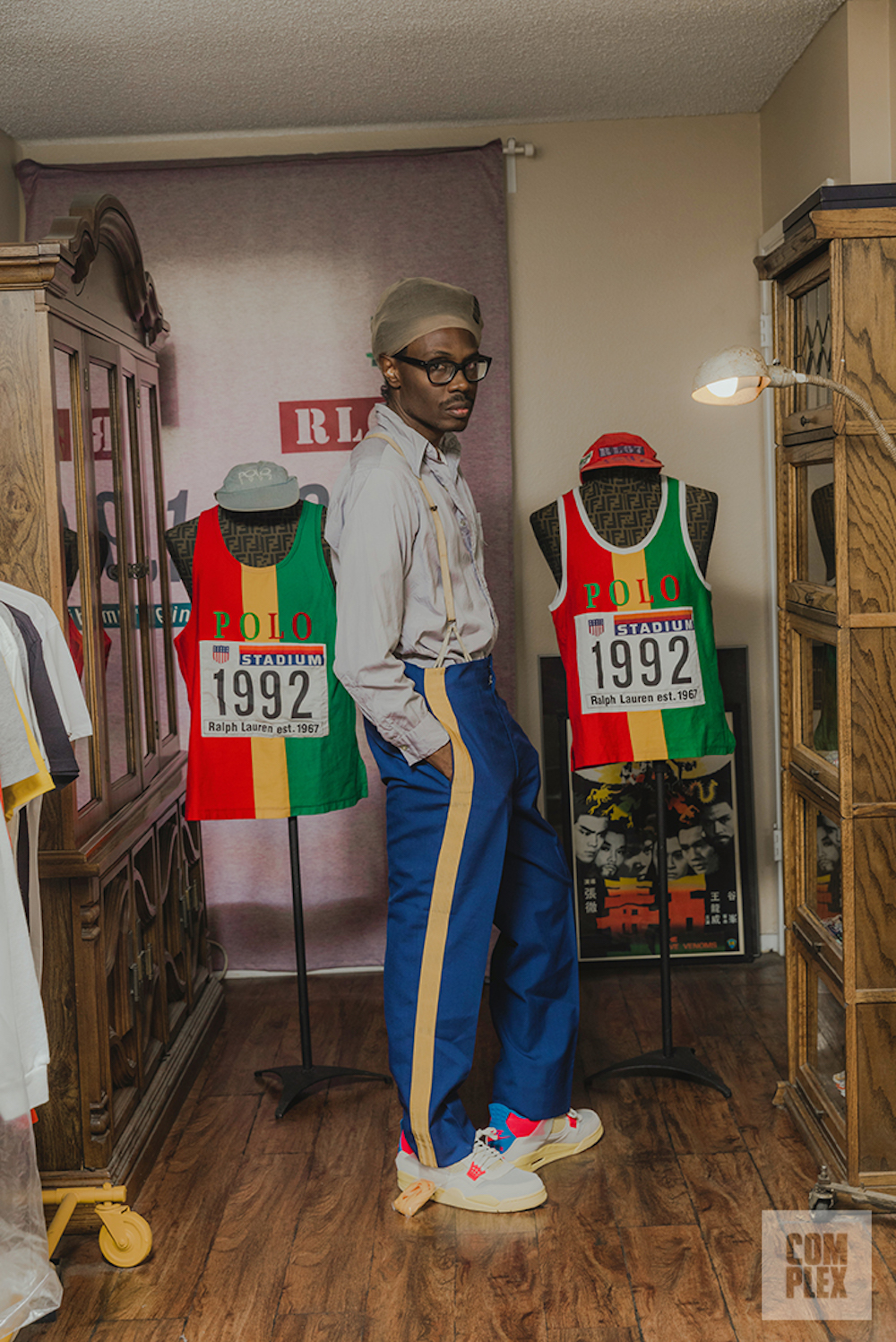
But he isn’t one to boast about his work with celebs. When asked for more details about collaborating with West, Abloh, or coming up with the ads for 50 Cent’s Formula 50 Vitamin Water, he pauses before answering each question and keeps the details to a minimum. When asked about his thoughts on the Travis Scott's McDonald’s collaboration—the latest development in corporate America tapping into hip-hop culture—he casually mentions that he was texting Scott about making action figures but that the timing didn’t work out. "In situations like this, I'm successful at making sure a rapper's brand stays in tact and the major brand gets the look they need as well,” says Reggieknow. “Perfect example of what I mean by ‘I'm a secret weapon.' I'm the best of both worlds, which allows me to make this a win win for everybody.” Reggieknow says the reason Scott would text him about making a McDonald’s Happy Meal toy is simple. “When those artists see how much of a hip-hop head I am—and how much I know about the culture, their work, and their contributions—they just trust what I'm doing and know they’re in good hands,” says Reggieknow. His approach to marketing continues to inspire young professionals in advertising today.
“His work is textbook. The purity, nuance, and the authenticity of it. Everything from the concept to the insight and execution of his work is so official that he became somebody that I studied more on the advertising side,” says Joel Rodriguez, a Queens rapper better known as Superbad Solace, who works as a group context director at Translation, an ad agency founded by Steve Stoute in 2004 that built on Reggieknow’s early marketing principles—Reggieknow also leads creative direction for Solace’s Sol Controller album series. “All of your favorite icons are fans of Reggie and have been studying that man's playbook for decades. But he's somebody who would prefer letting the work speak for itself and bring something original to the table. That's the most hip-hop thing ever.”
His love for hip-hop is apparent in his recent work for the Union x Air Jordan IV campaign that dropped this year. Chris Gibbs spoke to Reggieknow three days a week for the past year to build a campaign based on It Was a Good Day, a hip-hop anime originally titled This Day that Reggieknow started developing in the 2000s. The campaign included a four-minute anime short filled with 60 different hip-hop references, ranging from A Tribe Called Quest to Pink Siifu, and a lookbook with models who cosplayed as Reggieknow’s characters—Gibbs and Reggieknow even gave pairs of IVs away to whoever found the most references. Reggieknow has long sought to combine hip-hop with anime; in the early 2000s, he pitched to Cartoon Network a show titled Dog Backwards, an anime that Allen Iverson agreed to star in that reversed the roles of humans with dogs. Cartoon Network passed on the idea, but Urban Vision, a Los Angeles-based anime production company that connected him with acclaimed anime directors like Yutaka Minowa of Ninja Scroll fame, agreed to back This Day financially. Unfortunately, Urban Vision shuttered due to financial difficulties and Reggieknow’s anime was never produced. His hindsight's 20/20 because Netflix, a mainstream streaming platform, just announced that it was producing an anime based on the life of the Japanese Black samurai Yasuke.
“It was just too early. I mean, people didn't even really know what anime was yet, not even by name,” says Reggieknow. “I will tell you that in the entertainment world, it's not all fond of urban with intelligence. That's just my experience. It's different now that you have things like Atlanta out. They're starting to be like: “OK, well maybe urban can have something that’s a little smart.”
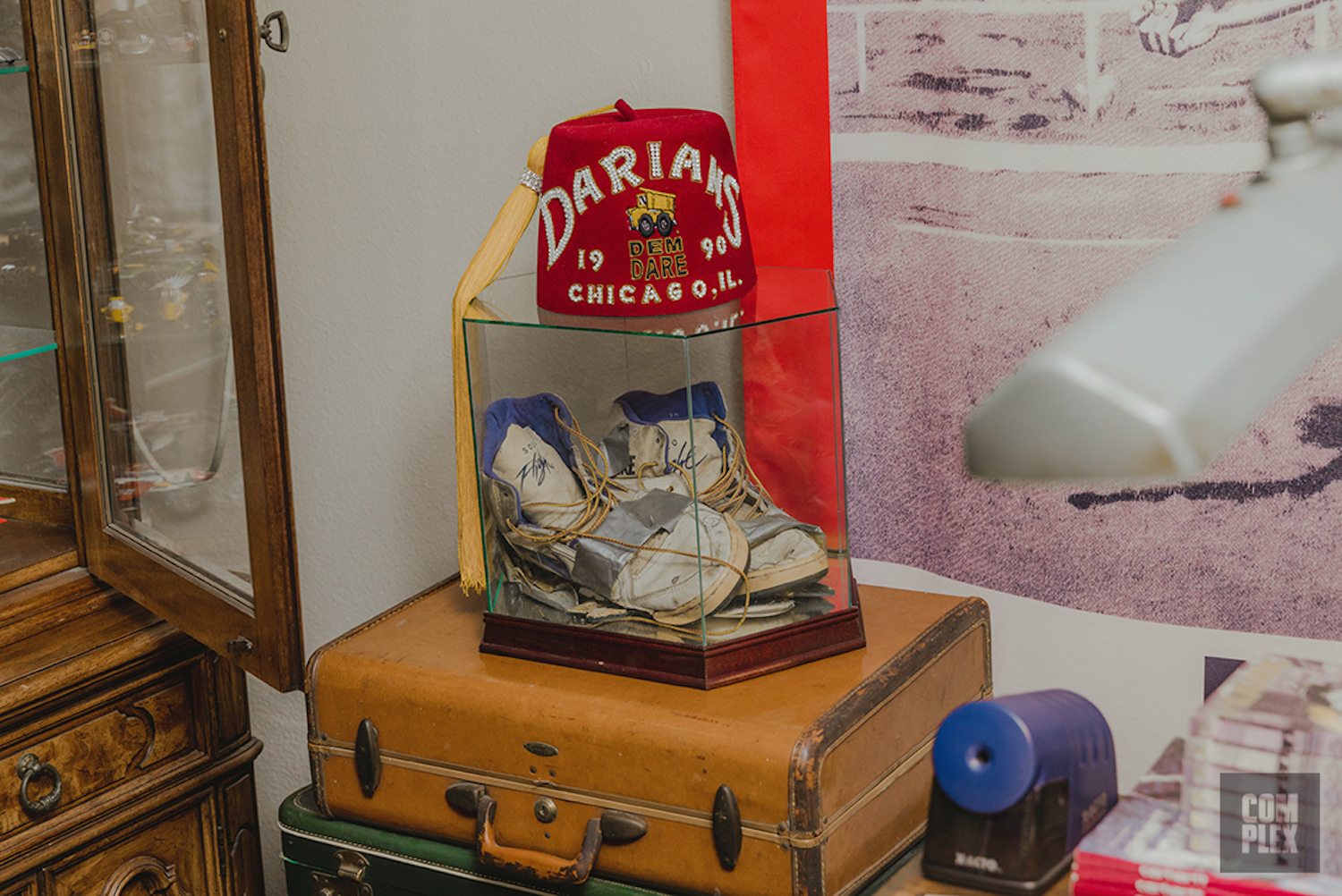
Reggieknow has been ahead of the curve for a while now. In the early ’90s, when Chicago wanted little to do with hip-hop, he fostered a scene and community for the growing genre with his crew, Dem Dare. DJ Twilite Tone, real name Anthony Khan, co-founded the party with Reggieknow and says the music was true “hardcore” New York hip-hop. “Building on these weird breaks, these weird sounds and soundbites. Hardcore was something that we weren't hearing at other parties,” says Khan. DJ’s primarily spun records from rising East Coast hip-hop acts like A Tribe Called Quest and De La Soul—rap that could only be heard on college radio stations at the time. The first party took place in 1990 and word of Dem Dare’s parties quickly spread as they grew from 75 attendees to a diverse crowd of 1,000 within the span of three events. Although Dem Dare wasn’t the first to throw hip-hop parties in Chicago, it blew a different jet stream of hip-hop into the Windy City.
“Chicago, being heavily into gangbanging culture and house music culture, the majority did not even know what to really do with rap music,” says Reggieknow, who points out that gangbangers embraced acts like N.W.A and other hip-hop heads in the city were stuck in the early ’80s Beat Street era. “It was considered breakdance music for a while after the fad of the movies went away. There were no hip-hop parties for the type of rap music that we liked.”
Khan, who co-produced Common’s debut album, Can I Borrow a Dollar?, and has recently worked with Kanye West and the Gorillaz, described the crew as misfits. “Everywhere we’d go, people would be like: ‘Here they come, that's them there.’ So we called ourselves ‘Dem Dare’ and it stuck,” says Khan. While Khan’s DJ sets headlined the parties, Reggieknow took control of the events’ hand drawn pluggers, or flyers, which were widely distributed at high schools and colleges throughout Chicago.
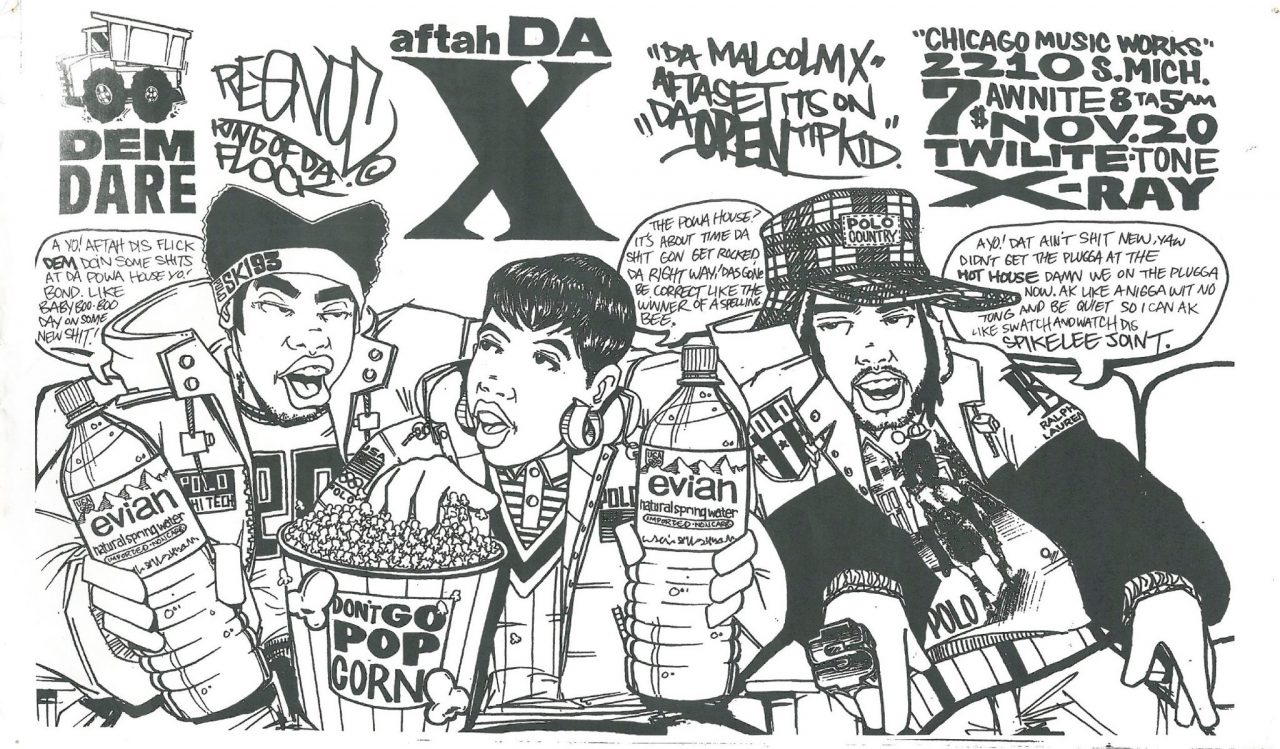
Dem Dare’s parties weren’t just local music events where guests could hear a new record from the afrocentric Native Tongues collective. The crew’s sense of style, which was reflected in Reggieknow’s popular flyers, defied stereotypes and showed attendees that the Dem Dare, or Darian, lifestyle presented a different path to success outside of the gangbangers who typically represented the streets of Chicago. “People thought we were nerds because we were eating right, drinking water, going to school, and talking about having goals. All we wanted to do was have the finer things in life,” says Disk Darian, a Dem Dare member who helped organize the parties and helped draw the graffiti letters on the flyers. Alongside East Coast hip-hop, Dem Dare was heavily inspired by popular Black Islamic movements like the Five-Percent Nation.
“Other hip-hop parties in Chicago were just full of angry dudes. The best thing I could say is that they were too ‘backpack.’ Parties where a cypher breaks out and there would be, like, three cyphers at once,” says Reggieknows’s close friend Wylie Styles, a fellow creative who frequented Dem Dare events and appreciated how the crew was inclusive towards women. “That crew was also so ill, fashion-wise, and Reg is the mastermind of that. But the ill part about Dem Dare was that it was also about Black excellence.”
Reggieknow drew characters wearing gear from Eddie Bauer, New Balance, Timberland, Nautica, Fila, and more. But Polo Ralph Lauren was the label he spotlighted the most. His illustrations flipped the brand’s country club image on its head, showing Black kids dipped in Polo grails like Stadium 1992 tanks tops, P-Wing cardigans, Hi-Tech ski jackets, and sit-down Bear knit sweaters. Los Angeles’ own Polo Don, Taz Arnold, who first met Reggie when he visited Chicago in 1992, distinctly remembered Reggieknow’s sense of style.
“He had the best dress sensibility in regards to wearing the clothes,” says Arnold, who notes that “Chicago’s Polo Don” looked fly in any brand. “He was telling people how to dress with those flyers, but he was the only one to attain that level out of his group. He grew up to look like his characters.”
There’s a video floating around the internet with a pre-College Dropout Kanye West getting his hair cut by Ibn Jasper and extolling the style virtues of Reggieknow, who he describes as “the God of Polo.” West recalls being stunned by how Reggieknow, a young Chicago cat with dreads, was able to afford $400 knit sweaters, gold fronts, and Cuban links in 1992 while everyone else, including himself, was putting $30 shirts on layaway. At one point he asks Jasper to stop cutting his hair so that he can properly emphasize how much he looked up to the “God of Chicago hip-hop.”
“This n***a walked by and I was like ‘Oh, shit!’ You would have thought you’ve seen a superstar! There goes Reginald!” exclaims West, who is grinning ear to ear and nearly losing his breath when speaking about Reggieknow. “I walked up to him, I had my Polo on, I just gave him a pound. Man, he gave me a pound and I was like: ‘Yeah, I know that n***a sees my Polo,” he says before breaking into laughter.
Although Dem Dare’s Polo fanaticism is frequently juxtaposed next to the Lo Lifes from Brooklyn, the luxurious look the Darians attained was not through boosting but through hard-earned dollars from actual careers, whether that meant DJing, throwing parties, or making Sprite commercials for Burrell. But despite how popular Dem Dare’s events became, not everyone applauded the crew. After the group got tired of the hate, the parties officially ended in 1994 and the Darians moved on to pursue their own personal endeavors.
“I think a lot of stories are told from New York’s and L.A.'s subcultures, but Dem Dare was ours,” says Abloh. “That Polo culture was an important movement that Reg spearheaded, and he developed the idea of Black kids in Polo with dreads. This is before the internet. Those flyers and the Dem Dare aesthetic, that was a fashion house to me.”
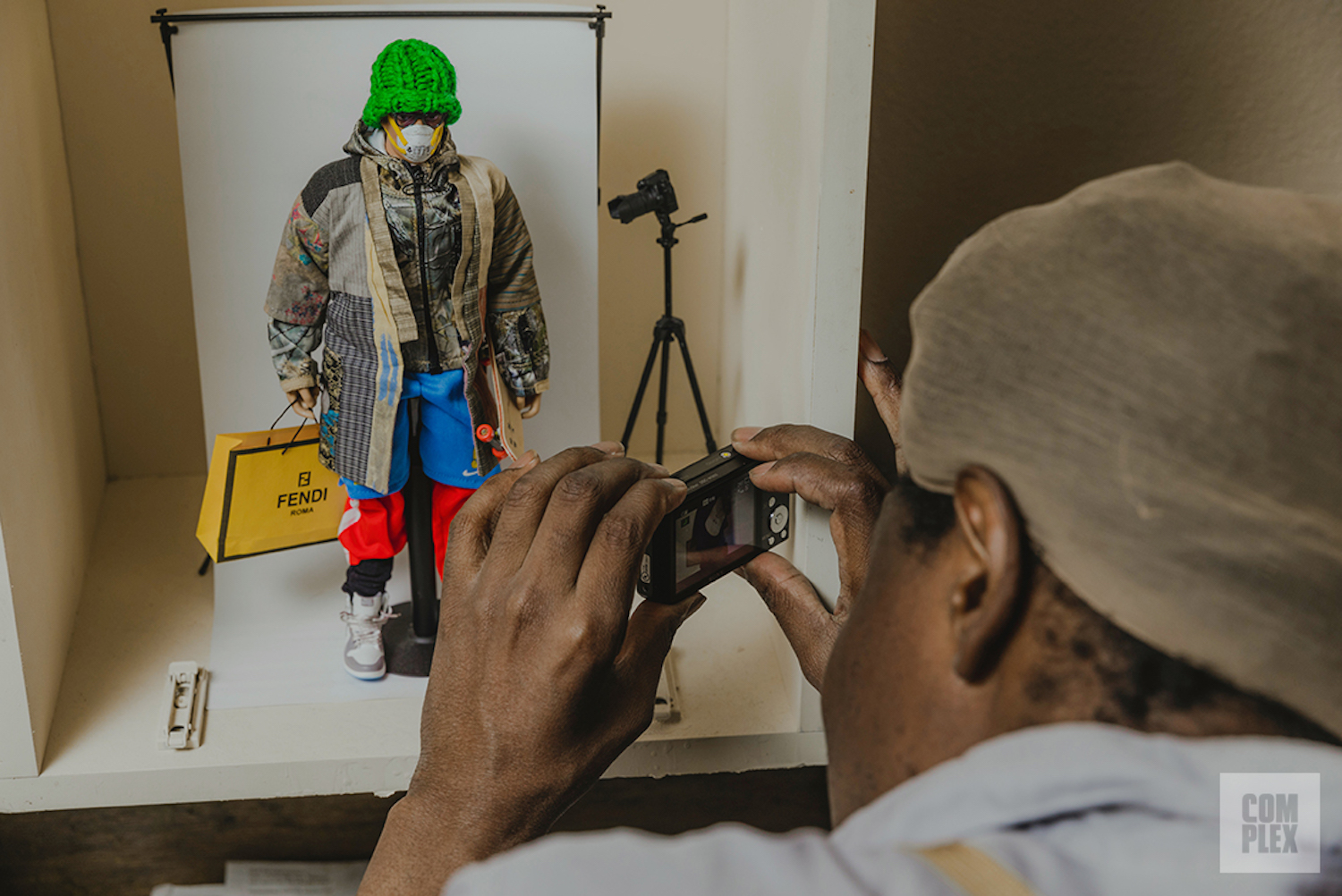
After becoming exasperated by living in the middle of America, Reggieknow left Chicago and moved to New York City in 2000 to live in Midtown Manhattan. Although he romantically remembers New York as the mecca of hip-hop in the ’90s before he moved there, and frequented the city with Lo collectors like Arnold, he found that the Big Apple did not suit a Black professional like him. “I was a better visitor in New York than a resident. At the time, you couldn't be so-called African-American and get a cab,” says Reggieknow, who hated taking the subway, preferring to work in the back seats of taxis. After living in New York for less than a year, he moved to Los Angeles in 2001 and has been there ever since.
The creative’s close friends in L.A. say you won’t see Reggieknow chilling on Fairfax. And Reggie says that if he does take a rare break from work, it’s to go to a local coffee shop alone to just stare at “nothing.” But he does give off a distinct aura when he steps out of his duplex in Chinatown, which doubles as the headquarters for Fashion Figure Inc., a company that produces 12-inch action figures that wear miniature streetwear garments. When he's not dressed in basics, his style is inspired by cosplay. Whether that’s intentionally walking into Union with a neck brace on, as a tribute to the comedian Andy Kaufman, or bumping a new Killertape with his boy DJ Kaleem in a ’67 Chevy Camaro modeled after the same car the character Jason drove in the ’70s anime Battle of the Planets, Reggieknow, who lives a sober lifestyle, does what he wants.
“He's absolutely the most eclectic person I know,” says Gibbs, one of Reggieknow’s closest friends in L.A. “I look up to him because he can keep his zeal and zest for creativity in a world that just doesn't really allow for that.”
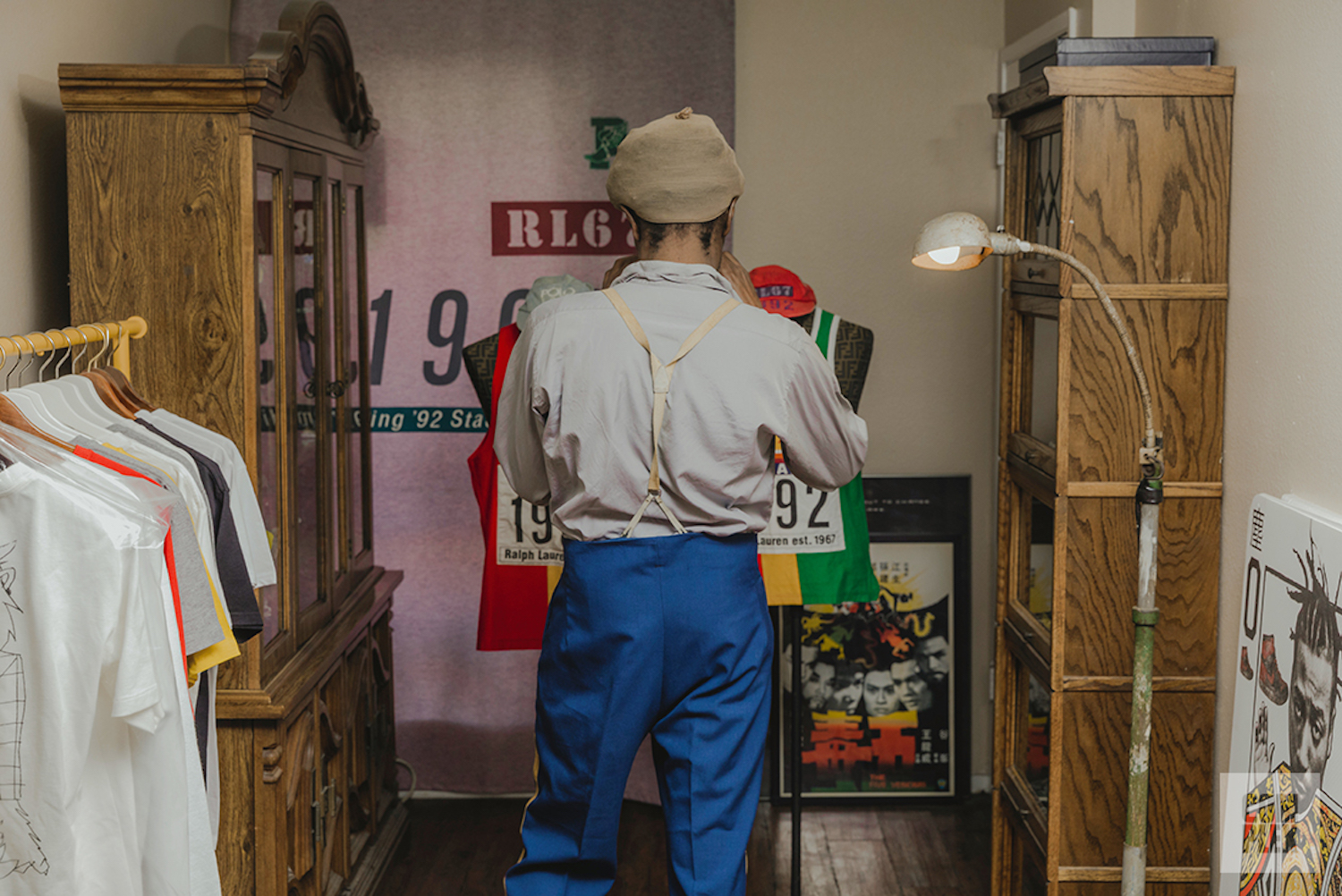
Reggieknow says he envisioned himself to be who he is today, but admits he thought he was going to be a little more successful. As a Black man in advertising, he’s been labeled “difficult” when calling brands out for not properly respecting Black culture. Other times, he’s struggled to secure budgets from major brands, who question if marketing to Black consumers is even necessary.
Brands have also flat-out rejected his ideas. He recounts a time when Hennessy was looking for urban artists to redesign their labels and he reimagined the Hennessy label to resemble the jerseys worn by Mobb Deep in the music video for “Shook Ones, Pt. II.” He went so far as to replicate the Hennessy font on their jerseys, switch out the label’s grapevine border with a collage of the Queensbridge houses, and even tweak the date to commemorate the year America’s largest housing project opened. The idea hits for any hip-hop fan, but when presented to the cognac brand, it went straight from the cradle to the grave.
“These brands, man, most of them are full of it,” says Reggieknow, in a soft but stern tone. “What we're witnessing heavily today is brands pretty much love Black culture coming from people who aren't Black. That's what they are ready to put the money up for. Now, mind you, people who are of the culture don’t discriminate based on skin color. It’s like if you’re dope, you’re dope. Nothing else matters."
Reggieknow believes making art for people who know that culture rather than the wider world is the main reason he isn’t as successful as he imagined himself to be. When explaining the motive behind the characters he conceived for Louis Vuitton, the Dem Dare flyers, Fashion Figure Inc., or It Was a Good Day, he points to a vintage silk scarf with a big Polo crest on it hanging in the interviewer’s room.
“The decor in your background is the perfect answer to this question, because it's like bringing the story of that that Polo Crest scarf to life, and in turn, connecting to those people who get it,” says Reggieknow. “People think the voices of these so called underground rappers that’s celebrated on The Killertape Network don’t count, and they are wrong. When you see Jay-Z putting out Mach-Hommy, there's my point."
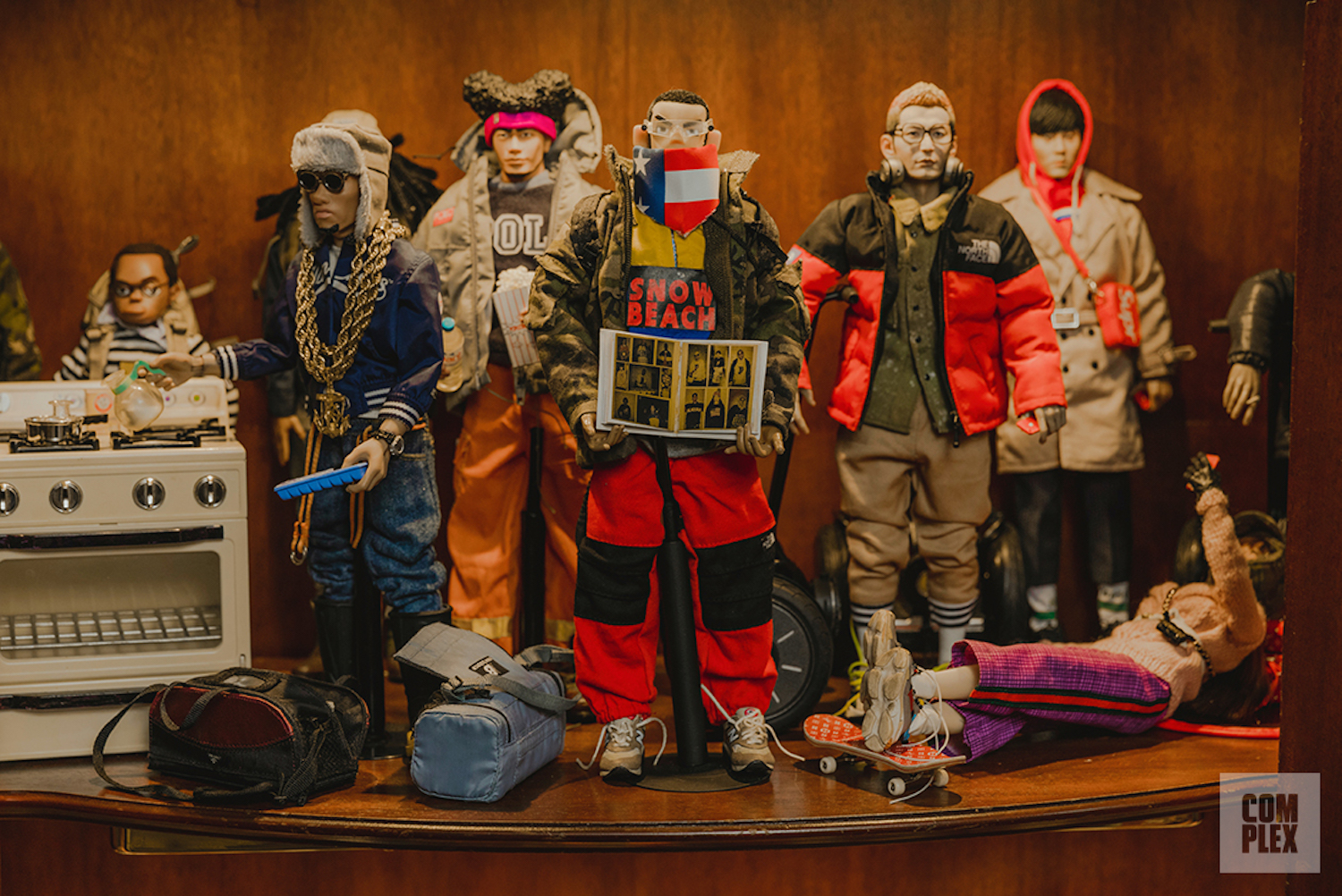
He’s been able to maintain creative autonomy with his own personal pursuits. Fashion Figure Inc.'s action figures sell for $700 to $5,000 and wear miniature vintage Polo grails, hyped sneakers, and real gold chains. Reggieknow launched FF Inc. in the early 2000s after he felt Polo began losing its luster when it dropped lines like Polo Jeans Company. He hires freelance sculptors, graphic designers, and tailors to bring the action figures, which are inspired by his own drawings, to life. Oksana Putyatina, a FF Inc. tailor who puts together their tiny garments on a sewing machine, says one garment can take up to four months to make. It took Reggieknow a year to build out the figure “Little Maurice,” a sneaker reseller who manages rap artists and rocks expensive vintage Polo grails, hyped sneakers, and a King Tut chain. His figures, which have been exhibited in streetwear stores and toy boutiques like RSVP Gallery, Union, and Toy Tokyo, capture the aspirational appeal of streetwear the same way his old Dem Dare flyers did.
“Fashion started to mirror fast food by becoming super generic and trendy,” says Reggieknow. “So instead of me being into fashion, I was looking at my action figures and decided I'm going get my fashion fix here. I'm still not into fashion, but my creative eye for it definitely shows through the figures.”
Another focus for Reggieknow is the Killertape Network, a mixtape series co-signed by rappers like Roc Marciano, Westside Gunn, GZA, and even the late Prodigy, that he’s creative directed for the past 20 years. His Killertapes highlight underground rappers who uphold “Black knowledge” and the pillars of classic East Coast hip-hop—the tape currently features MCs like YL, Solace, Starker, Mike, Sānt Jhon, Ankhle John, DøøF, and Theravada. The best way to understand it is to listen to the tapes, which feels like diving into a primordial soup of rappers birthed by Roc Marciano’s groundbreaking Marcberg project a decade ago.
“You got to be nice, raw, and in tune with knowledge—those are, like, the prerequisites of Killertape Network music,” says Al Dot Divino, a Killertape rapper from Lynn, Massachusetts, who’s not on the Billboard Hot 100 but can easily move 30-minute Bandcamp projects for $40 to $100 a pop to his hungry cult fanbase. “If you hit any three of those prerequisites, chances are, Reggieknow knows about you.”
There’s a picture of Reggieknow standing in a room with Westside Gunn, Benny the Butcher, Conway the Machine, and Kanye West that went viral on Twitter—Westside Gunn was featured on Killertapes several years before he released his debut studio album, Flygod. Reggieknow is standing a little bit out of frame, shyly looking at the Griselda crew while wearing an orange hat, cardigan over an anorak, and loafers with white socks layered over a pair of sweats. Hip-hop fans on Twitter were excited, but a good amount also clowned Reggieknow’s outfit, something that probably also happened in the ’90s, when Chicago hadn’t caught up to his wardrobe. But the picture perfectly represents Reggieknow’s role in hip-hop, streetwear, and marketing. Although he squarely has a hand in shaping culture, it also feels like he’s on the periphery of it. He’s an anomaly in a world that is increasingly driven by followers, likes, or whoever is able to sanitize and appropriate Black culture the quickest and translate it to the masses, and he’s well aware of this.
“Today's culture is all about who’s standing next to who in photo ops. I’m not trying to blow the spot up—that's just not my foundation,” Reggieknow says. “I think that's what people really like and respect about what I do. They know that I don't do the sellout thing, and I'm going to keep it authentic and real all the way. Luckily, I’ve been able to work with people that share my passion for authenticity and doing real creative work. Especially on my last few projects. It’s an honor. Truly.”

